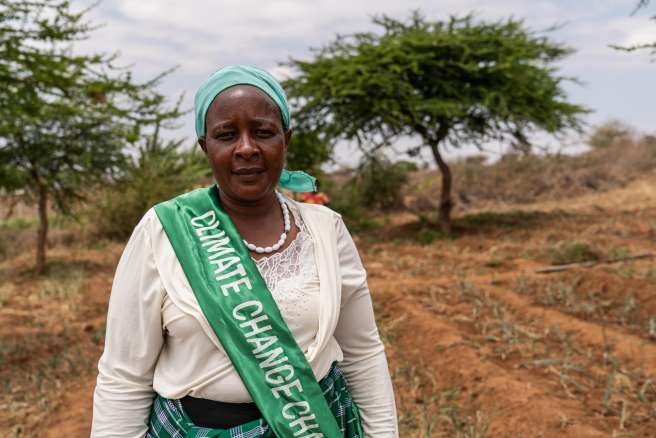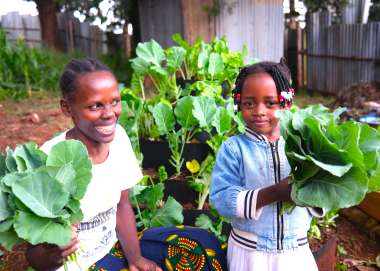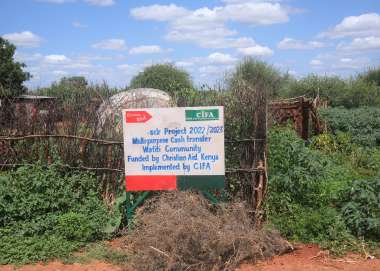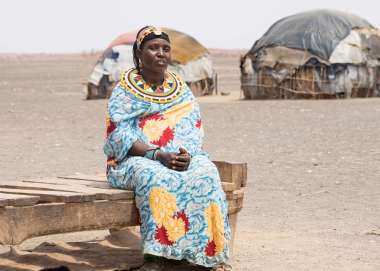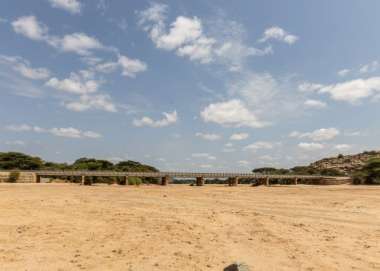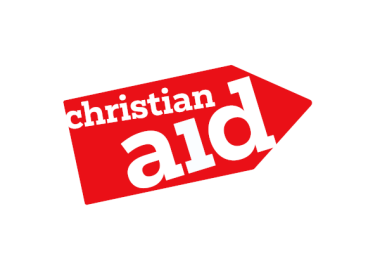We build and manage transformational partnerships with local civil society agencies, national and county governments, public authorities, the private sector, churches and religious organisations, who share common values in poverty eradication.
We currently work with over 30 partners across 20 counties, mainly in arid and semi-arid lands. Our work focuses on four key areas:
- Health and nutrition
- Climate change and energy
- Inclusive markets
- Humanitarian and resilience.
Country context
Since we started working in Kenya over 23 years ago, the country's narrative has changed for the better. Kenya has asserted its position as the economic, financial and transport hub of East Africa. The country has assumed a devolved structure of governance through the creation of 47 semi-autonomous counties.
With the GDP having grown at an average rate of 5% in the last decade, Kenya managed to transition from a low income to a middle-income economy in 2014.
In 2017, the president introduced the Big Four Agenda, encompassing manufacturing, affordable housing, food and nutrition security and universal health coverage as the pillars of socio-economic development in Kenya.
While this rosy picture is one chapter of Kenya's profile, there is another chapter which motivates us to continue to work for an end to poverty.
Image credits and information
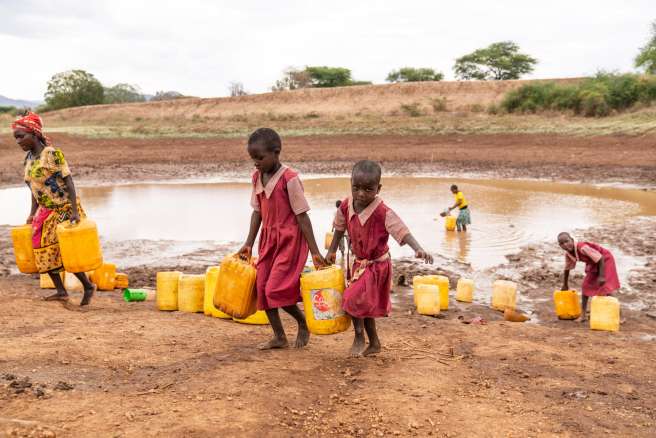
Why do we work in Kenya?
In Kenya, agriculture is practiced by at least 75% of the population and contributes 26% of the GDP. Over 75% output is from small-scale rain-fed farming and livestock production, which is being hit hard by the climate crisis and informal, exploitative market systems.
Covering up to 23 counties and accounting for about 16 million people, Arid and Semi-Arid lands (ASALs) make up to 89% of the country’s landmass. While these areas are of great potential (including renewable energy generation) they have been considered unproductive and, together with their populace, marginalised for decades. The result has been high levels of poverty, adverse climate shocks, and malnutrition.
While Universal Healthcare is part of the Big Four Agenda, the Kenya National Bureau of Statistics (KNBS) reported that in 2016 the leading causes of death were pneumonia, malaria, cancer, HIV/AIDS, anaemia, heart disease and tuberculosis. The Kenya Demographic and Health Survey (2014) noted that infant mortality stood at 39 per 1,000 live births. Malnutrition is reportedly responsible for 53% of child mortality.
Kenya grapples with weak governance, runaway corruption, underdeveloped infrastructure, high income inequality and high unemployment (especially among young people). According to the United Nations Development Programme, Kenya is ranked 137th out of 160 countries in the 2017 Gender Inequality Index. These are the reasons we continue to work in Kenya.
How do we root out poverty?
We seek to reach marginalised communities with interventions that will lift them out of poverty, help them make their voices heard, and empower them to challenge the structures that keep them in poverty. We do this through four work streams:
Health and nutrition
We contribute to responsive, accountable and equitable health and nutrition services in Kenya. We work towards improved health financing and governance to advance the progress of health systems towards universal health coverage for those most at risk of being left behind. Our second objective is to see improved agency and voice from women, girls, and other marginalised groups to challenge negative social norms that are barriers to accessing health and nutrition. Lastly, we support communities to hold health systems accountable to the health and nutritional needs of the population.
Climate change and energy
We spearhead the development of climate resilience in Kenya. We continue to provide guidance and advocate for mainstreaming and integrating climate change planning and response into county development processes, including County Integrated Development Plans (CIDP) and annual sector plans and budgets. Secondly, we work towards enhancing communities' resilience and adaptive capacity to climate change. We help communities to access sustainable energy for domestic and productive use. We build partnerships between the private sector and civil society organisations to help provide climate change and sustainable energy solutions.
Inclusive markets
Our objective is to contribute to resilient and thriving communities, who have the power to shape the decisions which affect their lives. To achieve this, we work towards increased productivity and income for small-holder producers, micro-enterprises, women and young people. Secondly, we work for enhanced access to inclusive financial services, inputs and working capital for small-holder farmers, women and youth. We design our programmes around increased access to markets for a wide range of people by improving bargaining power, collective action and information access by small-holder producers.
Humanitarian and resilience
In a country where humanitarian disasters hit every so often, our objective is to contribute to the empowerment of vulnerable communities to manage risks and build their resilience. Our continued work in this area is geared towards reduced disaster losses for marginalised families and communities, through effective and timely community-led responses, to support them to prepare and adapt to future shocks. We also help increase the resilience of vulnerable women, men, girls, boys, and marginalised groups to disasters by promoting community-led resilience strategies. Our last objective is to see increased voice of marginalised communities in influencing legislation on disaster-risk management and climate change initiatives for long-term resilience.
Image credits and information
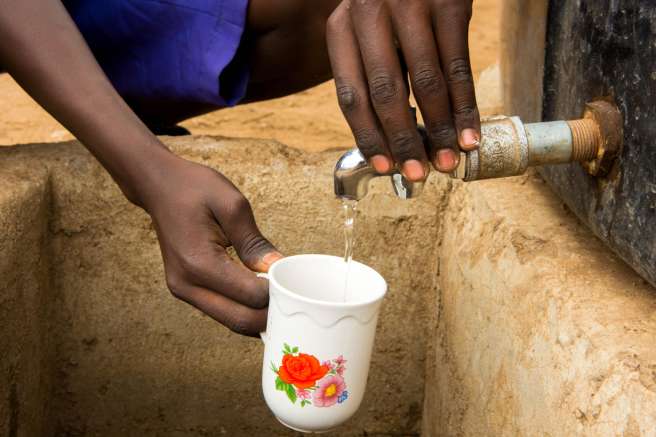
Our current portfolio and key achievements
Under health
Comprehensive Assistance Support Empowerment for Orphans and Vulnerable Children (CASE-OVC):
A USAID-funded five-year programme from 2017-2022 implemented in 18 counties in Kenya, supporting 171,000 orphans and vulnerable children to be resilient and thrive within their families and communities.
Adolescent nutrition:
This project contributed towards reducing the vulnerability of 5,804 rural adolescent girls to undernutrition and teen pregnancies, through school and community-based interventions in Transmara East, Narok County.
Integrating traditional birth attendants in improving adolescent reproductive health:
In Narok West involved re-orienting and re-organising traditional birth attendants from conducting deliveries to becoming mother companions and skilled delivery advocates. These re-oriented traditional birth attendants and ‘mentor mothers’ became champions for advocating for reproductive, maternal, newborn and child health services at health facilities. They helped us reach a total of 3,011 adolescent girls and young women, out of which 1,472 received ante-natal care, 563 had skilled deliveries, 505 had access to family planning services, and 454 received post-natal care.
Enhancing community-centric dialogue and implementation of universal health coverage:
Targeting 300 people in Nyeri and Isiolo counties, the project promoted meaningful citizen participation in the advancement of universal health coverage in Kenya.
Under the humanitarian work stream
East Africa Crisis Appeal project:
The project aims to:
- strengthen the resilience of pastoral and agro pastoral communities in Moyale sub-county and;
- build adaptive, responsive and transformative capacities of pastoralists through community-driven processes in Marsabit county in northern Kenya.
Through approaches such as Participatory Rural Appraisal (PRA) and self-help groups, the project has reached more than 3,000 women and men across 14 communities. A total of 12 PRA sites and 68 self-help groups have been established so far. The project has also created a strong feedback mechanism through the establishment of village accountability committees. Christian Aid Kenya has also been working with the Marsabit Indigenous Organisations Network (MIONET) to influence the development of climate change policy for Marsabit county, as well as the legislation of the disaster management policy.
Image credits and information
